Learn About 10 of the Most Beautiful National Parks to Visit During the Spring Time
Spring travel is often synonymous with blossoming flowers, blue skies, active bird and wildlife, and Goldilocks weather (warming up but not sweltering yet). It also often translates to fewer crowds and better prices. While many national parks are perfect to visit during any season, here are Winetraveler’s top picks to visit during the spring.
Yosemite National Park, California
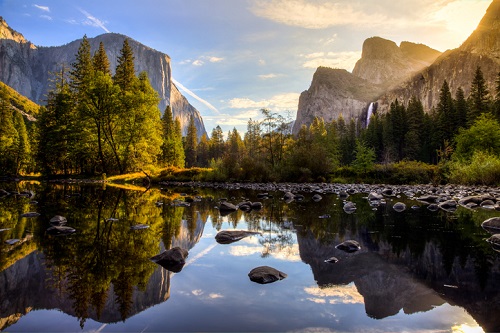
Yosemite National Park spans nearly 1,200 square miles in the Sierra Nevada with dramatic elevation changes from around 2,000 ft. up to 13,000 ft. Yosemite is a national treasure. From the Mariposa Grove of Giant Sequoias, Hetch Hetchy Valley, countless waterfalls, spectacular and varied rock formations, meadows, wetlands, cliffs, unsettled wilderness, museums, viewpoints, and of course, the iconic, Yosemite Valley. Spring may be the best time to visit this park for waterfall chasers when most of the snow is melting, and thus the waterfalls are at their peak. Popular spots are Yosemite Falls, Glacier Point, and Half Dome.
Bryce Canyon National Park, Utah
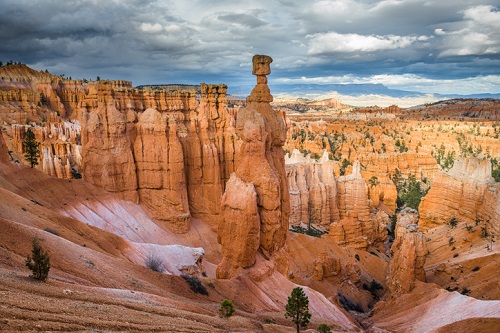
Bryce Canyon National Park is famous for its forest of orange-reddish hoodoos (really cool irregularly shaped columns of rock) and boasts having the world’s largest concentration of these natural wonders. Late spring is an excellent time to visit for moderate hiking weather but will have cooler nights. Hike deep into narrow canyons with switchbacks down, drive through natural rock bridges, and make it to the various scenic overlook spots accessible right from the parking areas. Review the NPS website for a list of the numerous hiking options separated by trail levels. The Sunrise Canyon, Sunset Pointe, Inspiration Pointe, and Bryce viewpoints are the most popular, but all the viewpoints can be enjoyed with relative ease. Thor’s Hammer, one particular iconic formation, is visible from Sunset Pointe. The best views of the numerous magnificent hoodoos are offered at the Inspiration Point and Bryce Point viewpoints.
Canyonlands National Park, Utah
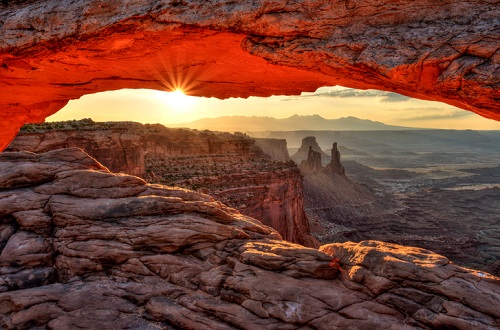
Canyonlands National Park covers 330,000 acres of countless canyons, buttes carved by the Colorado River and its tributaries, and expansive overlooks. Similar to Bryce Canyon, spring is a great time to visit Canyonlands for the same reason. There are numerous scenic ways to enjoy this park, including hundreds of miles of hiking trails, white water rafting trips (with a permit), climbing, horseback riding, and four-wheel-drive roads. Island in the Sky (near Moab) and The Needles offer day hikes. The Maze is more remote and generally better suited for overnight backpacking trips. The stars appear extra brilliant since there are few nearby cities. Make a point to come out at night to admire the dazzling night sky.
Saguaro National Park, Arizona
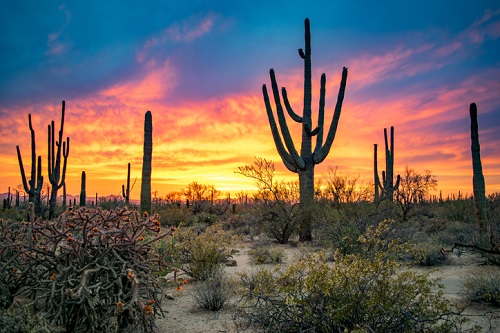
As its name implies, Saguaro National Park is home to the largest cacti in the US, the Saguaro Cactus. These tree-sized cacti are only found in a small part of the USA and are protected at this national park. With over 165 miles of hiking trails at various levels and lengths, there is a trail for everyone. For those eager to admire tall saguaros, the Loma Verde trail may be the trail for you. Many come here to seek out cacti silhouetted against the desert landscape at sunset. Tanque Verde Ridge Trail (on the east side of the park) and Gate Pass (on the west side) are two park favorites. Spring is an excellent time to visit. The white flowers on the saguaros start to bloom in late April and are at their peak around the last week of May.
RELATED: 10 Great Destinations to Visit in Sunny Arizona
Olympic National Park, Washington
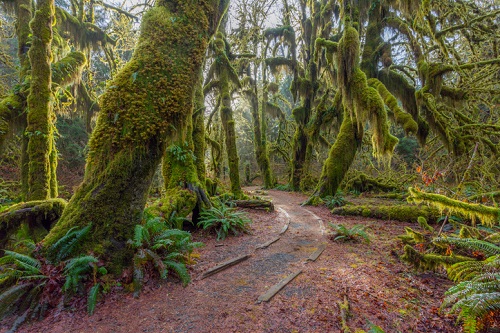
Glacier-capped mountains, rainforests, wildlife, and 70+ miles of coastline await you at Olympic National Park. Olympic is home to black bears, whales, salmon, elk, marmots, deer, and ~300 species of birds. The NPS website provides a breakdown of where to go for your best chance to spot some of the most sought-after wildlife in the park. Spring is an excellent time to visit Olympic National Park for temperate weather, fewer crowds than the summer, and April through May is a prime time to view whales during their spring migration season. Paddlers have their choice of rivers, lakes, or coasts. Hiking, fishing, tide-pooling, and stargazing are other popular activities in the park.
Big Bend National Park, Texas
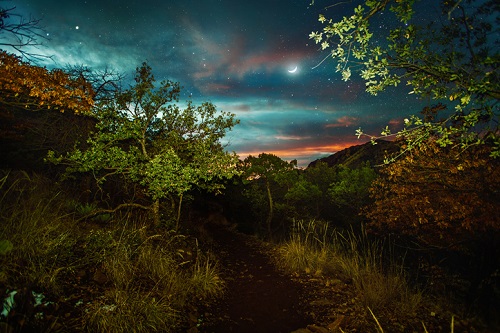
Big Bend National Park, located in west Texas near the border of Mexico, is a prime spot for stargazing and soaking in this desert-mountain paradise. Around 80% of the park is in the Chihuahuan Desert. Springtime (or fall) is an optimal time to visit the park to escape the extreme desert temperatures common in the summer or winter. The park offers more than 100 miles of paved roads for visitors to admire the expansiveness and beauty of this wilderness, along with more than 150 miles of hiking trails. The various hiking trails traverse through your choice of desert, the Chisos Mountains, or along the banks of the Rio Grande. Float down miles of canyons along the Rio Grande.
RELATED: Cabin-to-Cabin Road Trip: Big Bend National Park Itinerary
Guadalupe Mountains National Park, Texas
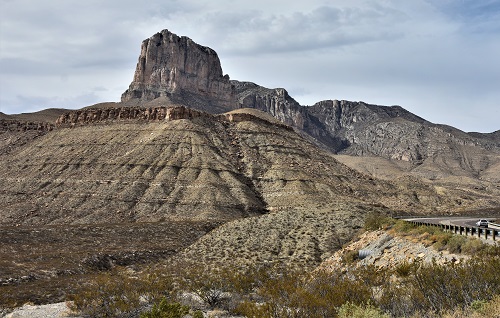
Guadalupe Mountains National Park is a backpacker’s paradise. With no paved roads into the interior of the park, while you can still catch scenic glimpses from the road, hiking is a must for an intimate park experience. For those passing through or unable to hike, you will be able to find some excellent overlook spots, such as El Capitan that rises 8,085 ft. The landscape is a mixture of mountains, canyons, dunes, and deserts. Many trails are on the lengthier side, but there are over 80 miles of trails for day hikes. One of the most popular trails takes hikers to the top of Guadalupe Peak. The trail is ~8.5-mile roundtrip with 3,000 ft. elevation gain. Another favorite is the McKittrick Canyon Trail.
Carlsbad Caverns National Park, New Mexico
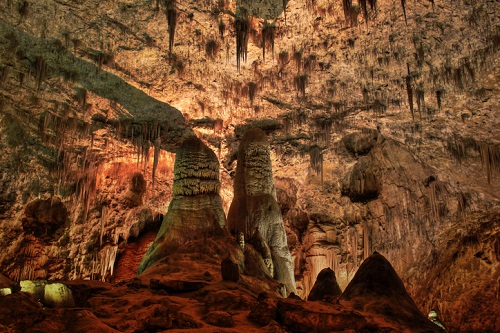
Underground and aboveground beauty abound at Carlsbad Caverns National Park, which is located in the Guadalupe Mountains and the Chihuahuan Desert in southeast New Mexico. This park is only about 40 minutes from Guadalupe Mountains National Park. Avoid the summer heat with a spring visit. Rugged mountainous terrain with cactus bushes is visible above the surface. Drive the 9.5-mile scenic loop through the park to admire the expansive barren landscape and select hikes to traverse the desert environment. Numerous mammals, birds, reptiles, and insects make this area their home. Barbary sheep blend in with the terrain.
Reserve your entry to the cave in advance as reservations are required and often sell out in advance. Take an elevator down 750 ft. below the surface to explore the extensive cave network at your own pace. The Big Room Trail is the most popular route. As stated on the NPS website, the Big Room “is the largest single cave chamber by volume in North America. . . . Actor and comedian Will Rogers called the cavern, ‘The Grand Canyon with a roof over it.’”
The Brazilian free-tailed bats migrate back to the cave around mid-to-late April and the Bat Flight Program runs late May through October. From the Bat Flight Amphitheater, watch the bats fly out of the cave around sunset.
Hot Springs National Park, Arkansas
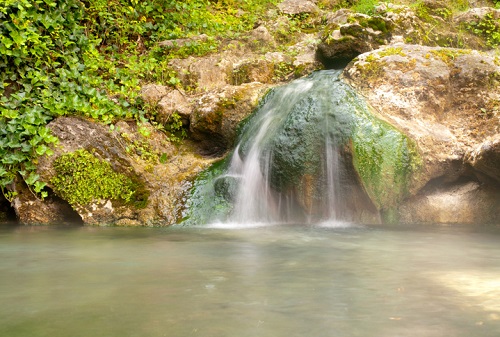
Hot Springs National Park is located right in the middle of town in Hot Springs, Arkansas. Thermal hot springs, hikes through thick forestry to mountain views, creeks, and mountains await. Touch the thermal water from two different outdoor spots: Hot Water Cascade, and the Display Spring. Soak in the water at historic bathhouses, such as Buckstaff Bathhouse and Quapaw Bathhouse. Drink the water from thermal spring fountains and/or cold spring fountains. Spring is a great time to visit the park for comfortable temperatures to enjoy the outdoors. Garavan Woodland Gardens is located nearby and spring is primetime to admire the floral landscapes.
Great Sand Dunes National Park, Colorado
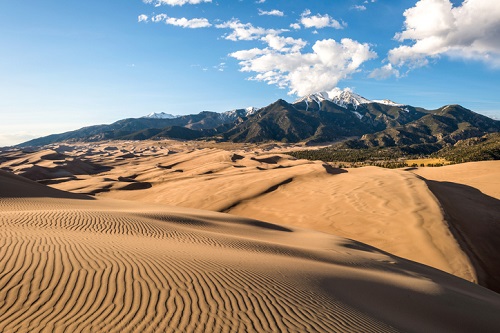
Experience sand sledding and sandboarding at North America’s tallest dunes in Great Sand Dunes National Park. As described by the NPS, these sand dunes are the centerpiece in a diverse landscape of grasslands, wetlands, forests, alpine lakes, and tundra.” The dune field is 30 square miles. The tallest dune, Star Dune, has a pyramidal shape and rises 750 feet from the base to the peak. In addition to dunes exploration, the park offers alpine trails, forested trails, grasslands, and wetlands. After working up a sweat, refresh at Medano Creek.
RELATED: 10 Beautiful National Parks To Visit in the Fall
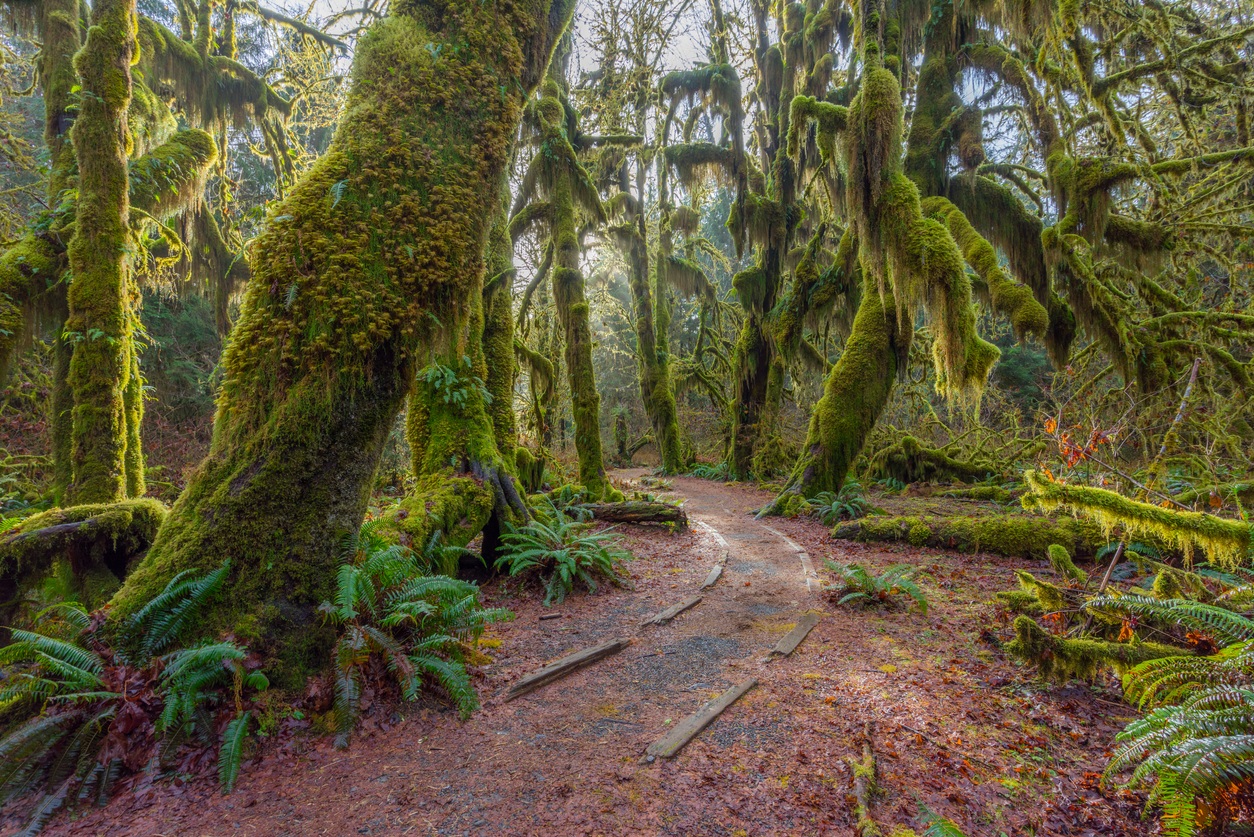
Impressive!! Thanks for sharing